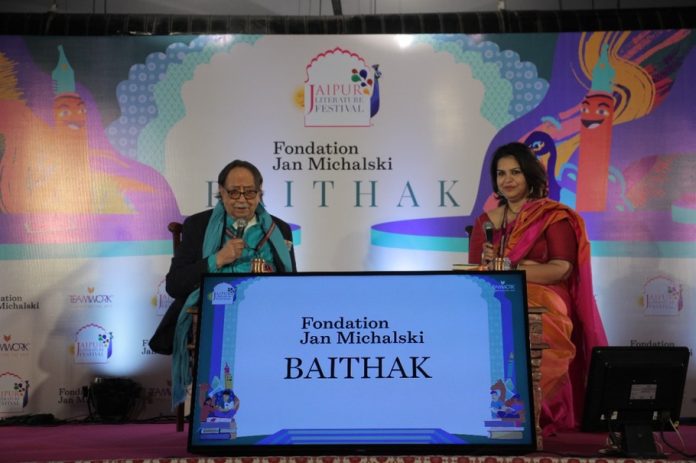
While speaking at the recently concluded Jaipur Literature Festival, former Indian ace spy master AS Dulat shared his observations and views on the current situation in J&K and abrogation of Article 370 with his characteristic gusto and candour.
Having held high positions in the Intelligence Bureau [J&K Division], Research and Analysis Wing, and being part of India’s ‘Track II’ team engaged in backdoor diplomacy with Pakistan, Dulat is undoubtedly a respected authority on Kashmir. However, while most of his observations are bang-on, some assessments made by him are debatable.
A ‘Mainstreamed’ Kashmir?
The top spy master’s view that All Parties Hurriyat Conference [APHC] is “all finished”, and that a “muscular policy” in Kashmir is helping security forces in Kashmir to curb terrorism are unquestionably correct. However, most Kashmir watchers may not agree with his assessment that Kashmir has “almost totally mainstreamed”, as the situation on ground doesn’t support this viewpoint.
There’s no doubt that the “Kashmir banega Pakistan [Kashmir will become part of Pakistan]” slogan has lost much of its sheen in Kashmir. However, this is due to the realisation among secessionists that given the firm determination of the center and security forces to defeat terrorism, the so called ‘armed struggle’ would never succeed. So, the decline in propagation of separatist ideology is the result of New Delhi’s “muscular policy” and not because of ‘mainstreaming‘.
Consequently, the ISI is instead tasking its proxies to promote religious radicalisation to fuel terrorism and thus keep its proxy war in J&K and this is evident from the upsurge in targeted killings of minority community members and migrant workers. Accordingly, it may be a bit premature to infer that Kashmir has “almost totally mainstreamed”.
So, while Dulat must have arrived at this conclusion after extensive interaction with locals in Kashmir, could it be that he has unwittingly been a victim of unintended misinformation? After all, hasn’t he himself highlighted this characteristic trait by stating that “a Kashmiri will tell you something in Islamabad, something in Srinagar”?
Article 370 Abrogation
Similarly, Dulat’s argument that abrogation of Article370 was unnecessary “because there was nothing left in it,” and that “it was only a fig leaf which had provided a Kashmiri a little bit of dignity…,” is surprising. Article 370 allowed erstwhile J&K to have a separate constitution, state flag and autonomy of internal administration, which was tantamount to an acknowledgment that it was not an integral part of India.
So, even though provisions of Article 370 may have been diluted through presidential orders over the years, it did give Islamabad a handy diplomatic stick to beat New Delhi’s claim that J&K is an integral part of India.
Dulat’s view that Article 370 “provided a Kashmiri a little bit of dignity”, is questionable. If Article 370 gave anything, it was just a heightened sense of arrogance that was evident by habitual use of the word “Indian” while addressing a non-Kashmiri. However, locals can’t be entirely blamed for their seemingly contemptuous attitude. “Special status” accorded by Article 370, gave many residents of Kashmir an impression that J&K was a separate entity and not part of the Indian Union.
The alienation promoted by Article 370 was successfully exploited by Islamabad as it gave implied credibility to its flawed narrative of J&K being a “disputed territory”. When none of the 564 erstwhile princely states that merged with the Union of India were accorded ‘special status’, making a sole exception in the case of J&K obviously gave an impression that its merger was indeed conditional. This is why Article 370 abrogation has rattled Islamabad like never before and has sent it running from pillar to post in a desperate attempt to undo the revocation of this temporary constitutional provision.
The fact that it did not succeed despite having approached UNSC and having raised this issue in each and every regional and international forum came as a double whammy for Islamabad. Firstly, absence of any meaningful support for Pakistan on this issue has effectively demolished its Kashmir narrative. Secondly, by rightly ignoring Islamabad’s ludicrous claims, New Delhi’s principled stand that Kashmir is an integral part of India has yet once again been vindicated.
Most importantly, UNSC and the international community has univocally endorsed India’s assertion of Kashmir being a bilateral issue between India and Pakistan with no scope whatsoever for any third-party intervention.
Militancy or Proxy War?
Lastly, Dulat’s view that “militancy has come down and will continue to come down. But terrorism will stay unless we sort it out with Pakistan”, is confusing and incongruent. The undeniable reality is that there was no such thing as ‘militancy’ in J&K- right from day one, this region has been experiencing a full-blown Pakistan army sponsored proxy war- and this admission has come from the horse’s mouth itself!
Readers may recall that Pakistan’s ex-President and former army chief Gen Pervez Musharraf himself revealed that “Kashmiris who came to Pakistan received a hero reception here. We used to train them and support them. We considered them as mujahideen who will fight with the Indian Army.”
Syed Salahuddin, who heads the ISI created Pakistan occupied Kashmir based United Jihad Council and is chief of the Hizbul Mujahideen terrorist group too has admitted that “we are fighting Pakistan’s war in Kashmir”.
So, when the masterminds of terrorism in J&K have themselves made it abundantly clear that the singular aim of the so-called ‘armed struggle’ is not to achieve any political or ideological object but solely to fight the Indian army, one fails to understand as to how one can one mistake brazen terrorism as ‘militancy’?
Sorting Out Terrorism
Dulat’s advice that “terrorism will stay unless we sort it out with Pakistan” makes good sense. But when terrorism has become the very mainstay of Islamabad’s foreign and military policy towards India, how on earth will New Delhi be able to “sort it out with Pakistan” remains a million-dollar question!
